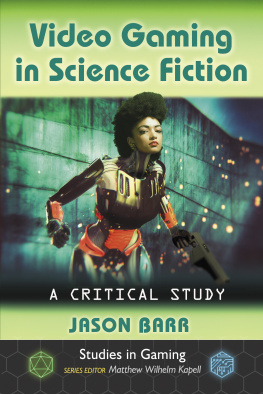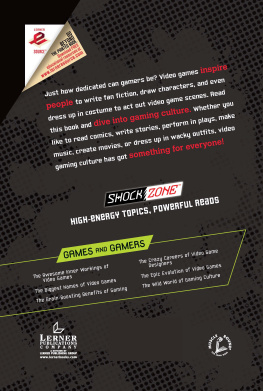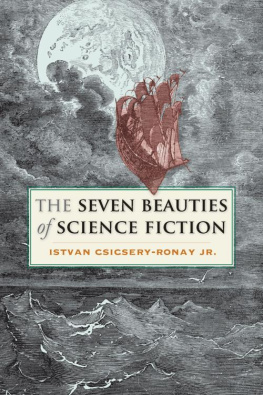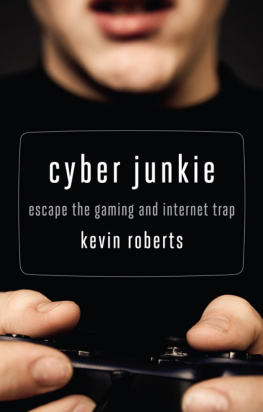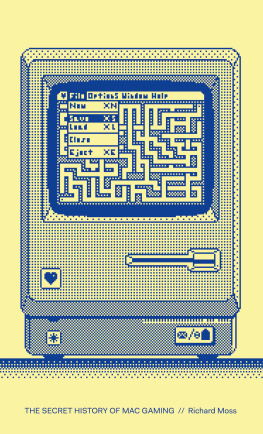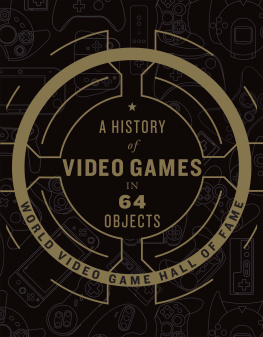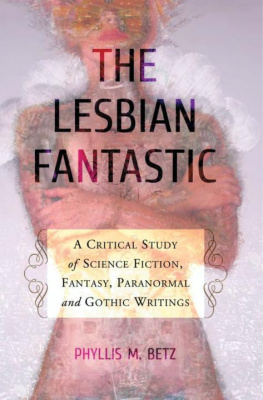
STUDIES IN GAMING
The Play Versus Story Divide in Game Studies: Critical Essays (Matthew Wilhelm Kapell, editor, 2016)
Player and Avatar: The Affective Potential of Videogames (David Owen, 2017)
Responding to Call of Duty: Critical Essays on the Game Franchise (Nate Garrelts, editor, 2017)
Speedrunning: Interviews with the Quickest Gamers (David Snyder, 2017)
Storytelling in Video Games: The Art of the DigitalNarrative (Amy M. Green, 2017)
The Minds Behind the Games: Interviews with Cult and Classic Video Game Developers (Patrick Hickey, Jr., 2018)
The Postmodern Joy of Role-Playing Games: Agency, Ritual and Meaning in the Medium (Ren Reinhold Schallegger, 2018)
Storytelling in the Modern Board Game: Narrative Trends from the Late 1960s to Today (Marco Arnaudo, 2018)
Teach Like a Gamer: Adapting the Instructional Design of Digital Role-Playing Games (Carly Finseth, 2018)
Video Gaming in Science Fiction: A Critical Study (Jason Barr, 2018)
Video Gaming in Science Fiction
A Critical Study
Jason Barr
STUDIES IN GAMING
Series Editor Matthew Wilhelm Kapell

McFarland & Company, Inc., Publishers
Jefferson, North Carolina
Also by Jason Barr: The Kaiju Film: A Critical Study of Cinemas Biggest Monsters (McFarland, 2016)
LIBRARY OF CONGRESS CATALOGUING DATA ARE AVAILABLE
BRITISH LIBRARY CATALOGUING DATA ARE AVAILABLE
e-ISBN: 978-1-4766-3429-6
2018 Jason Barr. All rights reserved
No part of this book may be reproduced or transmitted in any form or by any means, electronic or mechanical, including photocopying or recording, or by any information storage and retrieval system, without permission in writing from the publisher.
Front cover images 2018 iStock
McFarland & Company, Inc., Publishers
Box 611, Jefferson, North Carolina 28640
www.mcfarlandpub.com
Acknowledgments
My wife and children have always been incredibly supportive of my writing adventures, so special thanks to Tracey, Vincent, and Lily for their patience. I would also like to thank the editors and staff at McFarland for their help, support, and assistance I enjoyed while working on this manuscript. Thanks also to the two anonymous readers for their critiques of and recommendations on the preliminary manuscript. And, lastly, I would be remiss if I didnt think of (and thank) all of the gamers, gaming companies, and authors out there who have continuously attempted to define and explore what makes a video game a game.
Preface
And what if our life is someone elses game?Lucky Wander Boy
To start with a disclaimer: I have played video games for much of my life. My very first gameoutside of playing Dig Dug or Q*Bert on the arcade machines at our local pharmacywas Peanut Butter Panic for the Tandy TRS-80 computer. Soon after, I progressed to the Nintendo Entertainment System, and then through each successive generation of consoles: sometimes Sega, sometimes Sony, sometimes Microsoft, and so on. One of my earliest video game memories is playing the NES Ice Hockey game on Christmas day until I vomited. And then I played some more. It was probably at that point that I realized that the lines between hobby, passion, and obsession were excruciatingly thin. Even now, at age 41, I continue to incorporate video games into my life. Although I dont play games for those vomit-inducing long periods of time, I do play games, as do my children. Thus, many of my ideas about the way video games interact with our lives and through the world of science fiction prose are borne through personal experience, as well as my interactions with other video gamers, from those casual gamers who keep sending me notifications to participate in Words with Friends, to the group of people who frequent the video game retail stores on the midnight of a major release.
Those of my generation who were lucky enough to own a Tandy or an Atari or even the Nintendo Entertainment System could be considered digital gaming pioneers. Of course, video games existed in their earlier form a little before that in the arcades, but they werent readily accessible to most buyers. Before then, gaming took the form of quarters dropped into huge arcade machines located in sweltering mall storefronts or shoved into the corner of a local restaurant. Those who grew up in more rural areas may have played an arcade game once a week; those in more populated centers had their choice of arcade machines, so long as their supply of quarters remained steady. And, as we grew, so did the video gameseight-bit graphics gave way to sixteen-bit, which gave way to the then-earth-shattering 64-bit graphics. With each successive generation of console and PC, the games became more complex, in graphics and in capabilities. Famous musicians and actors started to provide the sound of the games, and they became less of a waste of time and more of an art form to be dissected and criticized, sometimes for better or for worse. Every now and again, I go back to play some of the first games I enjoyed, such as Punch-Out! Or Super Mario Bros. and, outside of a quick whiff of nostalgia, I think of the old phrase you cant go back again. The games are definable classics, but whereas I played Ice Hockey on the NES almost all Christmas day, the white glare of the ice punishing my eyes, I could only really enjoy it twenty years later for a few minutes. I have even gone back to play some games that arent too far removed from todays era, such as Silent Hill 2, which I remembered as being one of my absolute favorites of all time. Silent Hill 2, even the remastered version, looks and feels like a game that is, well, almost two decades old now. Going back to play it again showed me fuzzy graphics, odd sound effects, and clunky controls, providing me with a sense of deep disappointmenthow could I have ever loved that game so much? Perhaps modern video gamers are spoiled.
Anyone who was born and raised during the video game revolutionwhere it seemed each new console release provided a massive technological leap over the prior console generationcan appreciate just how magnificent games are today. Even some of the games that have been critically panned, such as Watch Dogs, would have made us salivate over the possibilities twenty years ago. And, along with this explosion in video game popularity has come video game culture, as indefinable as it is frustrating, as niche as it is accessible, and, in the end, a relatively confounding phenomenon. More people playing video games, and more money being spent on video games (by both companies and players) has led a relatively new entertainment industry into uncharted waters, where questions of diversity, equality, and fairness can result in often outsized and ugly actions by small but vocal portions of the group. Even so, modern mainstream perceptions of what makes a gamer, as we will see, have rarely been correct, and often have buried at their foundations the very same stereotypes that came into being in the 1980s.
This growth of video gaming culture has led many critics and academics to wonder about how people perceive the world of the video games. Garry Crawford, Ian Bogost, Jesper Juul, and Greg Comitskey, among many others, have written numerous volumes trying to understand a variety of topics, often focusing on the popularity of video gaming. Academics have rushed into the field and have mined topics from violence to sexuality to nostalgia to marketing. From a theoretical standpoint, most of the discussion has centered around purely academic projects of reality and fantasy and the conflict between leisure and the quotidian. In some cases, however, the very concept of the gamer is examined: what makes a gamer, and how do we know that they are a gamer? In many areas of pop and contemporary culture, the academic discussion falls by the wayside, and the very idea of being a gamer is often suffused with negativity. This has hindered study of video games, mostly because the audience has been successfully stigmatized. Outside of academia (and even, in some cases, in academia as well), video gaming culture remains an outcast, buried in negative depictions.
Next page
